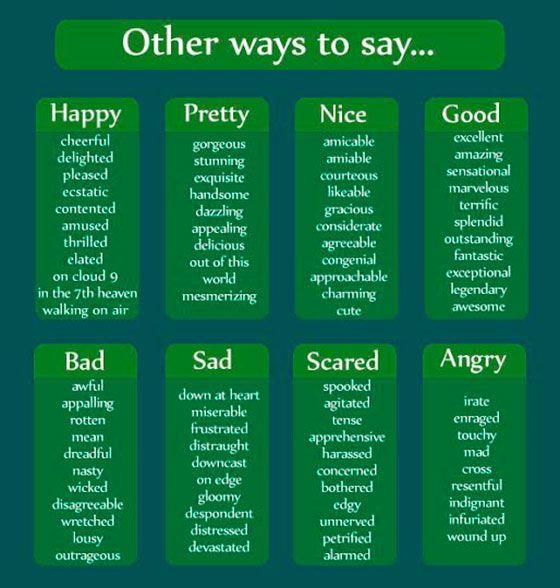Positive traits of highly sensitive person
Navigating the World When Highly Sensitive
There is a certain negative or critical tone that used to exist in referring to someone as sensitive. Perhaps it was and still can be an inherent belief that sensitivity is the opposite of being tough, resilient, or strong. The truth is, being a sensitive person takes tremendous strength to navigate the world and the people in it. Often those that are highly sensitive are deeply introverted and empathetic, two traits that take much courage and resilience to touch base with the rest of society. Thankfully, increased discussion of concepts like empathy and introversion has led to a more positive view of being a highly sensitive person. But the question remains, how can one deal with being sensitive to the world around them?
Traits of a Highly Sensitive IndividualThere are essentially three categories that can help you measure if you’re a sensitive person, each coming with their own triumphs and challenges. Personal sensitivity or one’s own feelings, sensitivity to others, and sensitivity to one’s environment are all different aspects of someone’s personality that make up this trait. What does this look like?
Personal sensitivity – Difficulty letting go of thoughts or emotions, fear of rejection, constantly comparing oneself to others, feelings of anxiety or tension, and feeling frustrated by situations that seem unjust or unfair.
Sensitivity to others – Worrying about what others think and feel, a tendency to take things personally, feeling that others are judgmental, struggles to be oneself in group settings, difficulty receiving critical feedback
Sensitivity to one’s environment – emotionally sensitive to large crowds of people, feeling discomfort at certain external stimuli such as bright lights or loud sounds, feeling upset while reading about the news, getting overwhelmed easily when it feels as if too much is going on.
The positive traits of people that are highly sensitive include emotional awareness, empathy for others, the ability to pick up on small cues that others miss, dedication to fairness and justice, passionate and innovative thinking, and an ability to demonstrate good leadership through valuing others.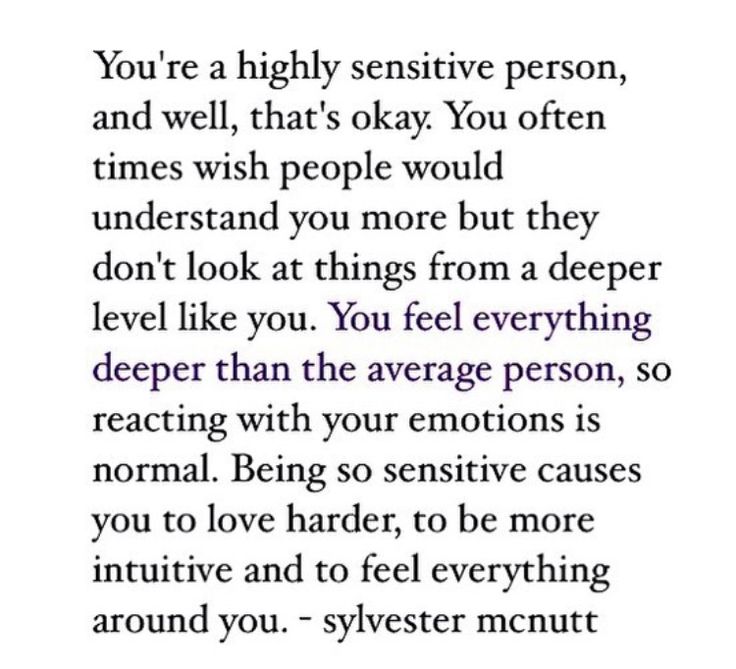
Something specific to and extraordinary about those that are highly sensitive is that while some of their traits have the potential to make it harder to interact with the world around them, they can be incredibly beneficial when embraced instead.
Seeking Calm – Because being a sensitive person can often feel like overstimulation, many seek calm in order to help manage the stress it can cause. In doing so, they often become the calm for others, making them an asset in otherwise high-stress jobs. Sensitive people also tend to be highly empathetic, giving them the tool of being able to better emotionally identify with others. While it’s important for sensitive people to be aware of taking on the feelings of others themselves, they can often be the most trusted and helpful support for their loved ones.
Trusting the Intuition – Feeling a significant amount of sensitivity to the world around them, these individuals are often highly perceptive and emotionally aware. This can help one develop the ability to “trust their gut” when it comes to decision-making, helping sensitive people to be efficient and dynamic leaders.
This can help one develop the ability to “trust their gut” when it comes to decision-making, helping sensitive people to be efficient and dynamic leaders.
Thinking Through Decisions – On the other side of intuition, when a “gut-feeling” doesn’t exist to help with decision making, those that are highly sensitive are often more aware of subtle details, which can make them more cautious decision-makers. They often feel the need to deeply think things through in order to avoid making a “wrong” decision. This can be helpful in leadership roles or jobs where a high degree of trust is required, making them thoughtful in their choices and considerate of the effects they can have on others.
Allowing Emotions to Inspire Passion – Sensitive people are often deeply feeling and, therefore, passionate about the things that matter to them. They can be very imaginative, perceptive, and deep thinkers, helping them with creativity and innovative thinking.
Connect to Others – People that are highly sensitive often work well with others in team and group environments.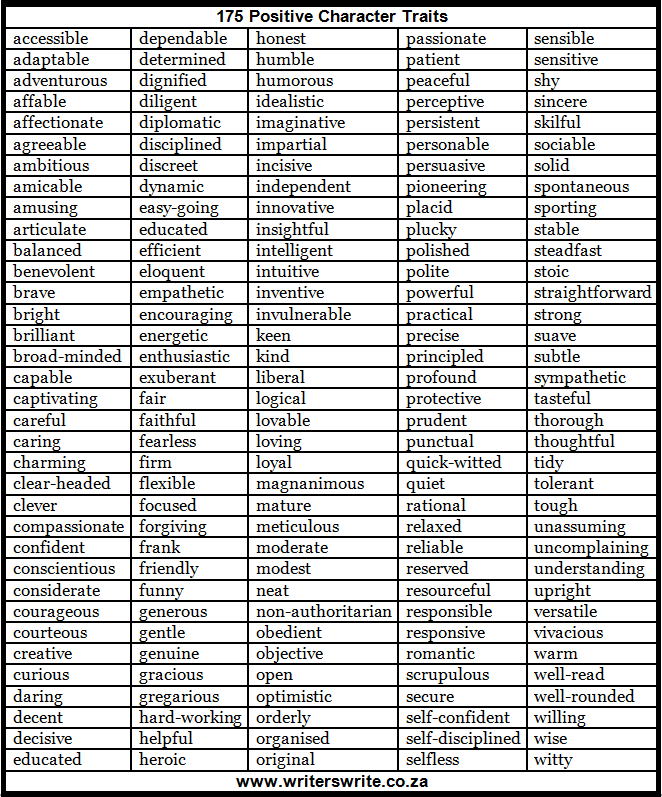 Deep and intuitive thinking often helps them work as part of a whole. Their sensitivity to the criticism of others might make it difficult for them to be the final decision-maker of the group. They are often conscientious and courteous, assisting them in navigating conflicting ideas. Due to the fact that many sensitive people are empathetic, they can be good communicators and be thoughtful of the feelings of those around them.
Deep and intuitive thinking often helps them work as part of a whole. Their sensitivity to the criticism of others might make it difficult for them to be the final decision-maker of the group. They are often conscientious and courteous, assisting them in navigating conflicting ideas. Due to the fact that many sensitive people are empathetic, they can be good communicators and be thoughtful of the feelings of those around them.
Being a highly sensitive person can be overwhelming in many ways. Emotions, sensory experiences, and other people can all feel larger than life and seem like too much to experience at times. Instead of shying away from sensitive traits and avoiding a deeply feeling nature, leaning into these characteristics and giving them space to flourish can help a person become an amazing leader, co-worker, friend, and partner. We need sensitive people to connect us to our humanness and the beauty of the experience of feeling.
Ashley Addiction Treatment is an innovative treatment program located on Maryland’s Chesapeake Bay.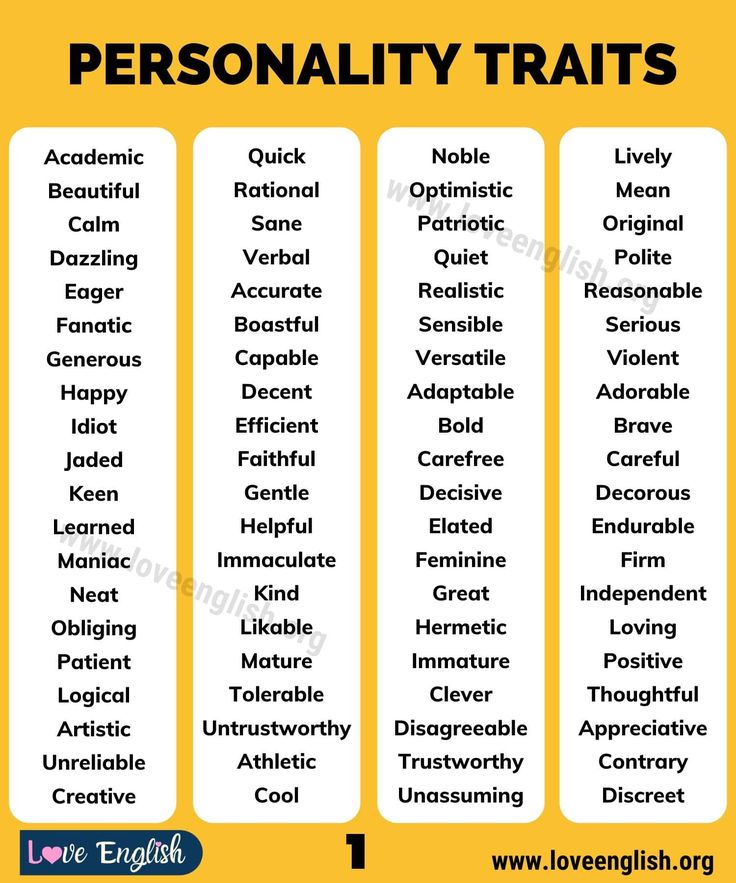 Ashley provides support for professionals seeking help with addiction. We are able to help people with co-occurring disorders and offer confidential treatment programs to meet your needs. Please reach out to us today at (800) 799-4673.
Ashley provides support for professionals seeking help with addiction. We are able to help people with co-occurring disorders and offer confidential treatment programs to meet your needs. Please reach out to us today at (800) 799-4673.
14 Traits of Highly Sensitive People
Source: Clovera/Shutterstock
Do you think and feel everything more deeply?
If so, then you may be one of the 20 percent of people who fall into the category of being a highly sensitive person (HSP).
Characteristics of a Highly Sensitive Person
Biologically speaking, highly sensitive people pick up on more stimuli within and around them. Studies have shown that the HSP brain is more active in areas related to attention, emotion, action-planning, decision-making, and having strong internal experiences.
In fact, managers consistently rate people with higher sensitivity as their top contributors. As professionals, HSPs are innovative, deeply committed to fairness, and have a knack for leading teams of people in a way others simply can’t.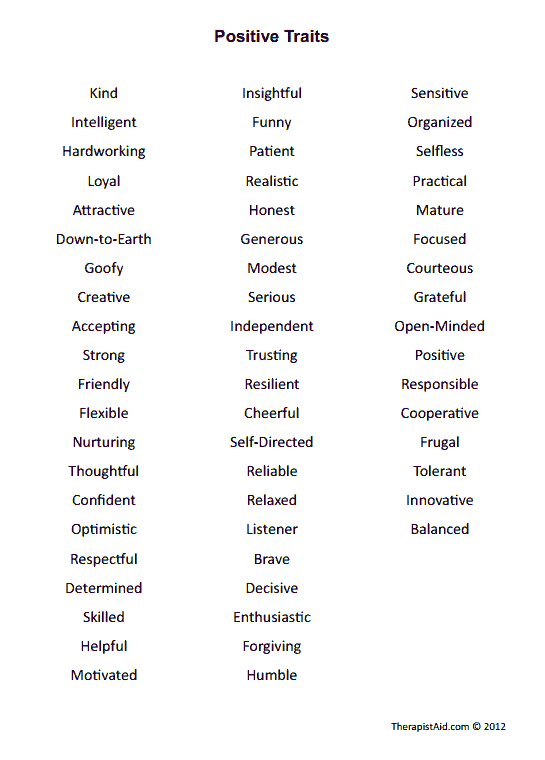
At the same time, hyper-attunement can be draining. Situations that might be moderately stressful to the average person can cause a sensitive person to spiral into overthinking.
This is especially true for "Sensitive Strivers"—highly sensitive people who are also high-achieving. The concept of sensitive striving comes out of my decade of researching and coaching. Sensitive Strivers are like HSPs but also show above-average ambition and an appetite for continual growth.
14 Signs That You’re a Highly Sensitive Person
If you relate to most of the following, you can confidently call yourself an HSP.
1. You're extremely empathetic.
HSPs possess a keen ability to sense others’ feelings, needs, insecurities, etc. Science proves it: HSPs are shown to have more active mirror neurons, which are responsible for understanding others' emotions. Your emotional intelligence and empathy make you a master at communication, conflict resolution, and inspiring others to action. Unfortunately, you may also slip into people-pleasing and putting others’ needs ahead of your own.
Unfortunately, you may also slip into people-pleasing and putting others’ needs ahead of your own.
2. You cherish reflection.
As a highly sensitive person, you operate best when you have time and space to reflect before responding. You pick up on nuances and are skilled at making connections and integrating complex information. It's essential to give yourself the chance to process all that information you're constantly taking in.
3. You hear “don't take things personally” (a lot).
HSPs tend to react more strongly to situations. You may sometimes wonder why you are so deeply affected by the world around you while others brush things off easily. HSPs may feel like there is something wrong with them for being so sensitive. As a result, many spend years denying their gifts and strengths.
4. You freeze under pressure.
Working under a deadline might make you anxious, and speaking up in meetings is terrifying. Having a giant to-do list is overwhelming.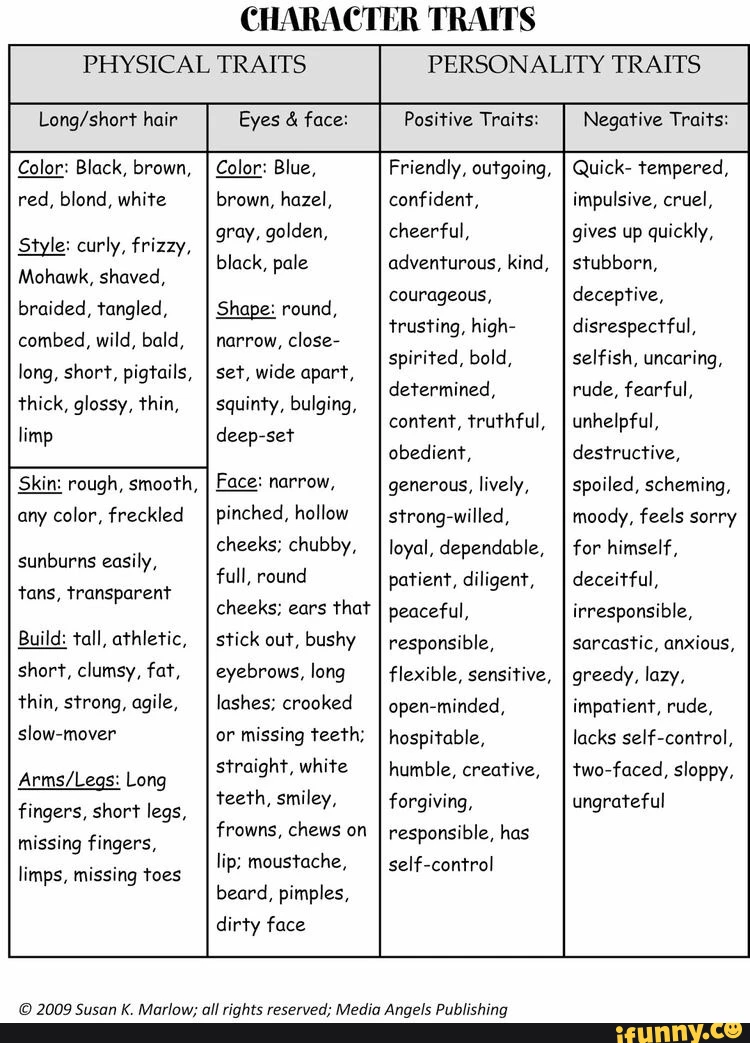 That’s why it is essential to find ways to manage your time, so you don’t become overstimulated.
That’s why it is essential to find ways to manage your time, so you don’t become overstimulated.
5. You're at home inside your head.
HSPs have vibrant inner lives. This means you are an incredibly original, creative thinker who is extremely self-aware. On the flip side, it’s not uncommon for you to overthink and over-analyze day-to-day experiences, causing you to veer off into self-consciousness and self-criticism.
6. You have a tough time with negative feedback.
HSPs react more strongly to criticism than non-HSPs. Therefore, they may go out of their way to avoid being criticized, such as by working extra-hard, which leads to burnout.
7. You're deliberate in the way you make decisions.
HSPs often struggle to make decisions; they fear choosing the “wrong” option even if the stakes are low. Because HSPs are so conscientious about how their decisions impact others or how they may be perceived,
8. You're on top of the details.
HSPs are extremely perceptive.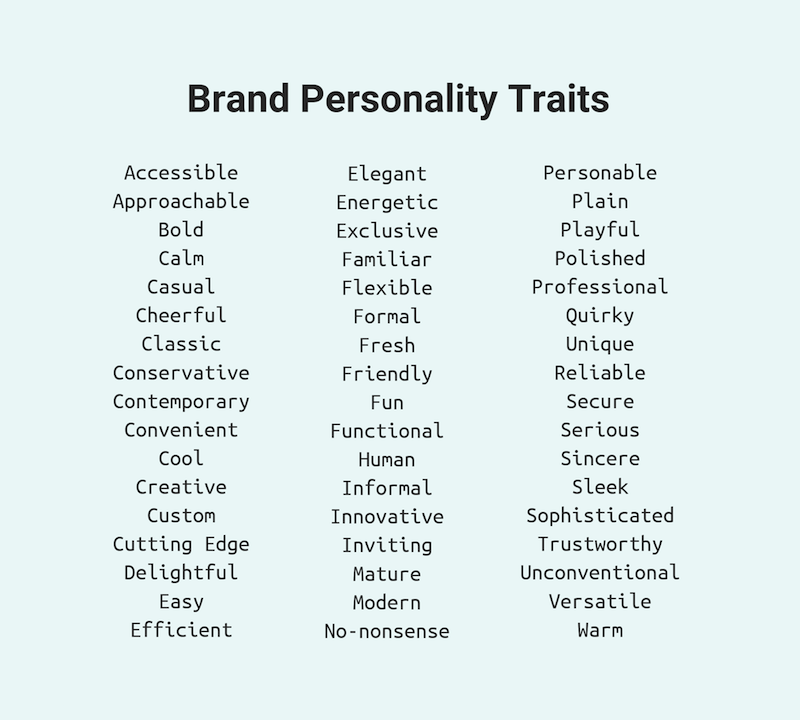 They pick up on the specifics of situations and notice the tiniest changes. This detail orientation is a positive trait in many scenarios. You’re highly attuned to others’ likes, dislikes, and preferences, and that perceptiveness can win you friends and allies right off the bat. On the flip side, your meticulousness can turn into perfectionism if you don’t manage it carefully. Remember, sometimes done is better than perfect.
They pick up on the specifics of situations and notice the tiniest changes. This detail orientation is a positive trait in many scenarios. You’re highly attuned to others’ likes, dislikes, and preferences, and that perceptiveness can win you friends and allies right off the bat. On the flip side, your meticulousness can turn into perfectionism if you don’t manage it carefully. Remember, sometimes done is better than perfect.
9. You exude kindness.
You’re often complimented on your politeness, courtesy, and clear understanding of what’s right and what’s wrong. You’re probably the champion of integrity and upholding your word at the office. While these traits are important, HSPs can be easily peeved by difficult co-workers who don’t share the same traits or values.
10. You're a problem solver.
Commitment and dedication are qualities that make HSPs great team members. Always attentive to the environment, HSPs are able to sense conflict, mitigate problems, and flag new opportunities.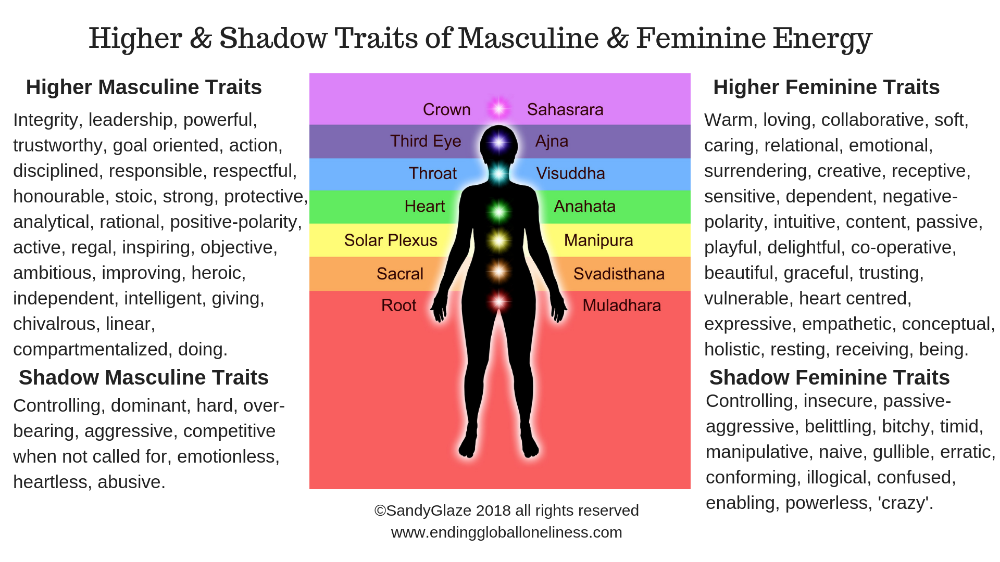
11. You notice what others miss.
Ever left a meeting and remarked about your boss’ incessant pen-tapping only for your co-worker to say, “Oh, I didn’t notice that”? Highly sensitive people are attuned to and process noise, chaos, and other external stimuli profoundly, so what may be a major annoyance to you could go pretty much unnoticed by a non-HSP.
12. You go through tissues like it's your job.
HSPs become overwhelmed more quickly than others, and that often manifests itself in tears. It’s important to realize that while you may be able to manage your emotions more effectively, they are nothing to be ashamed of.
13. You enjoy working from home.
Highly sensitive people often prefer work environments where they can control the external stimuli, such as how well-lit, quiet, or uncluttered their workspace is, making them partial to working from home as opposed to an office with an open layout.
14. You seek meaning and purpose.
HSPs are driven by intrinsic factors (such as finding enjoyment in their work) rather than external ones (such as money or prestige).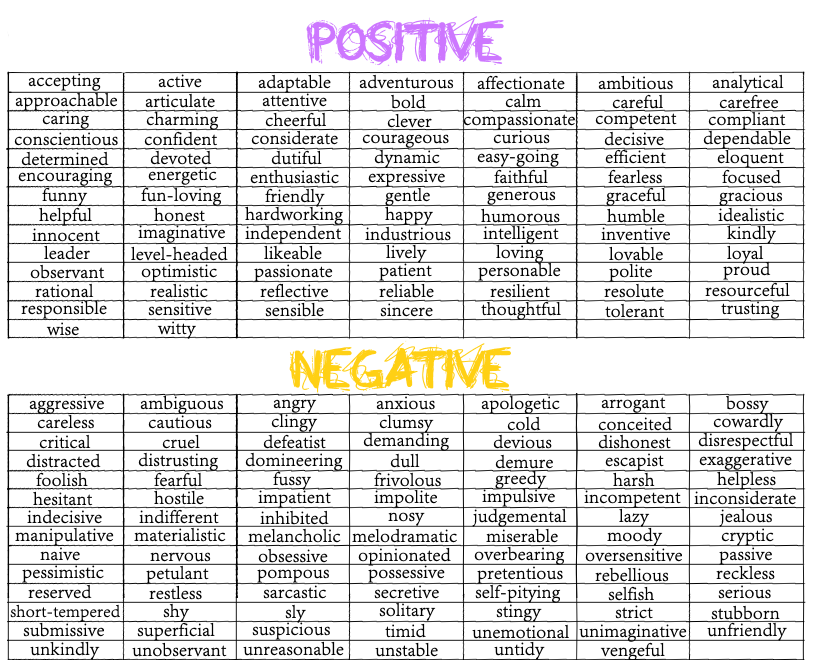 You are the type of person who looks for work that feels like a calling, rather than taking a job just for a paycheck.
You are the type of person who looks for work that feels like a calling, rather than taking a job just for a paycheck.
If you have spent your life confused and unhappy with your strong emotions, try to think instead about ways that you can use these traits as gifts and leverage them as strengths. Learning about how your unique HSP traits work is the first step.
Facebook image: Clovera/Shutterstock. LinkedIn image: stockfour/Shutterstock
Close to the heart: what is high sensitivity and how to live with it
Health
© Eternal Happiness/Pexels
Author Varya Borodina
04 February 2020
Intolerance to noise, fear of the crowd, acute experience of any failure and increased emotionality - all this can be experienced by highly sensitive people. We understand why they are like that and what science knows about them.
"You take everything too close to your heart" - these words have been heard by everyone whom nature has endowed with high sensitivity. Science has long ignored the anxieties and concerns of vulnerable people, but in the last ten years the doctrine of sensitivity has become a trend, and at the end of the 2010s it moved into the mainstream. One of the first books on this topic is “Supersensitive nature. How to Succeed in a Mad World” by psychologist Elaine Ayron has become almost a classic of popular psychology literature today. nine0003
Science has long ignored the anxieties and concerns of vulnerable people, but in the last ten years the doctrine of sensitivity has become a trend, and at the end of the 2010s it moved into the mainstream. One of the first books on this topic is “Supersensitive nature. How to Succeed in a Mad World” by psychologist Elaine Ayron has become almost a classic of popular psychology literature today. nine0003
The abbreviations HSP and SPS can often be found in the Western press. The first is called Highly Sensitive Persons, and the second refers to the reason that makes them so fragile. The central nervous system of some people is literally more sensitive—it responds more strongly and processes physical, emotional, and social stimuli more deeply. This phenomenon is called Sensory Processing Sensitivity.
To understand how sensitive you are, you can take a test that measures four parameters: the depth of information processing, a tendency to nervousness, emotional reactivity and the ability to read between the lines (catch the nuances of phenomena, situations, characters).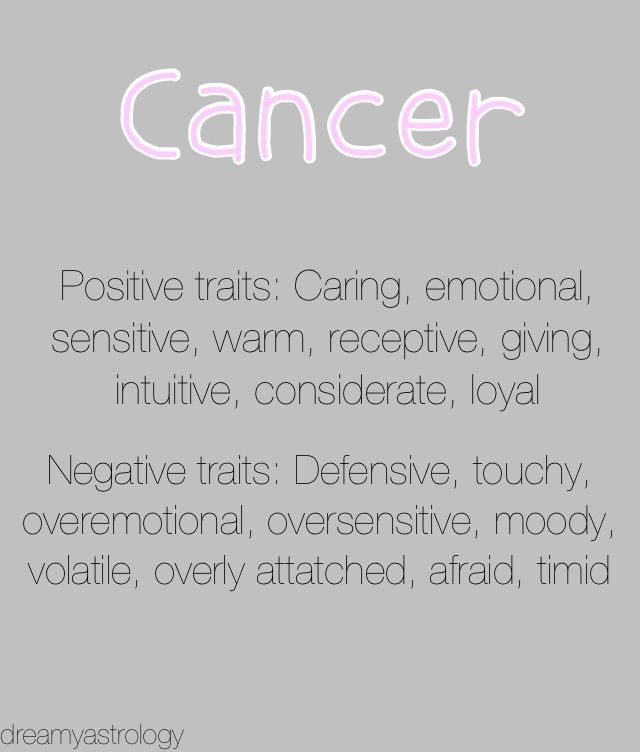 nine0003
nine0003
Advertising on RBC www.adv.rbc.ru
Highly sensitive people are more likely to indulge in reflection, worry more about other people, themselves, the future and the whole world, it is difficult for them to make decisions, accept criticism, and they can also suffer in a loud and fussy environment. Therefore, they are even called “new introverts”, but do not confuse the concepts - sensitive people may well be extroverts, they just react more sharply to everything that happens in the world. It does not follow from this that high sensitivity is a disadvantage. This is just a personality trait that can be made into an advantage. nine0003
From anxiety to vivid emotions
Emotional reactivity indicates the ability to respond more sharply to external stimuli. It may manifest itself in different ways. On the one hand, a person deeply experiences failures and reacts sharply to gross physical stimuli (unpleasant music, pushing, screaming, etc.). But this same reactivity helps to experience positive emotions more vividly and makes even the most everyday life more intense.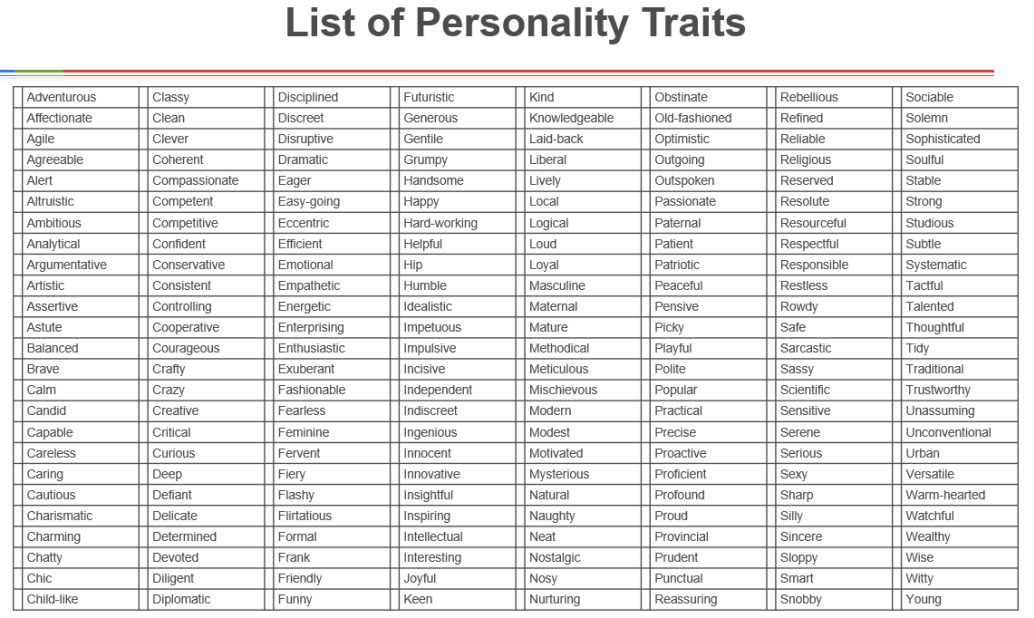 Concerts, festivals, fireworks and colorful shows, travel and outdoor activities, spiritual conversations with loved ones, spiritual practices, simple joys like delicious food and strong hugs - all this a highly sensitive person lives brightly, from the bottom of his heart. nine0003
Concerts, festivals, fireworks and colorful shows, travel and outdoor activities, spiritual conversations with loved ones, spiritual practices, simple joys like delicious food and strong hugs - all this a highly sensitive person lives brightly, from the bottom of his heart. nine0003
From indecisiveness to balance
According to Elaine Ayron and her colleagues, highly sensitive people have a harder time making decisions. Excessive attention to details interferes with making a decision: a person digs into the nuances, makes endless lists of pros and cons, and eventually slides into painful rumination (scrolling the same thoughts with negative overtones). Considering that many sensitive people have a hard time with criticism, they are especially afraid of making the wrong decision. nine0003
However, the ability and desire to analyze is a useful skill in life and at work. Such a person is a valuable member of the team, because it is he who will be able to painstakingly study all aspects of an important issue, calculate risks and notice nuances that are invisible to others.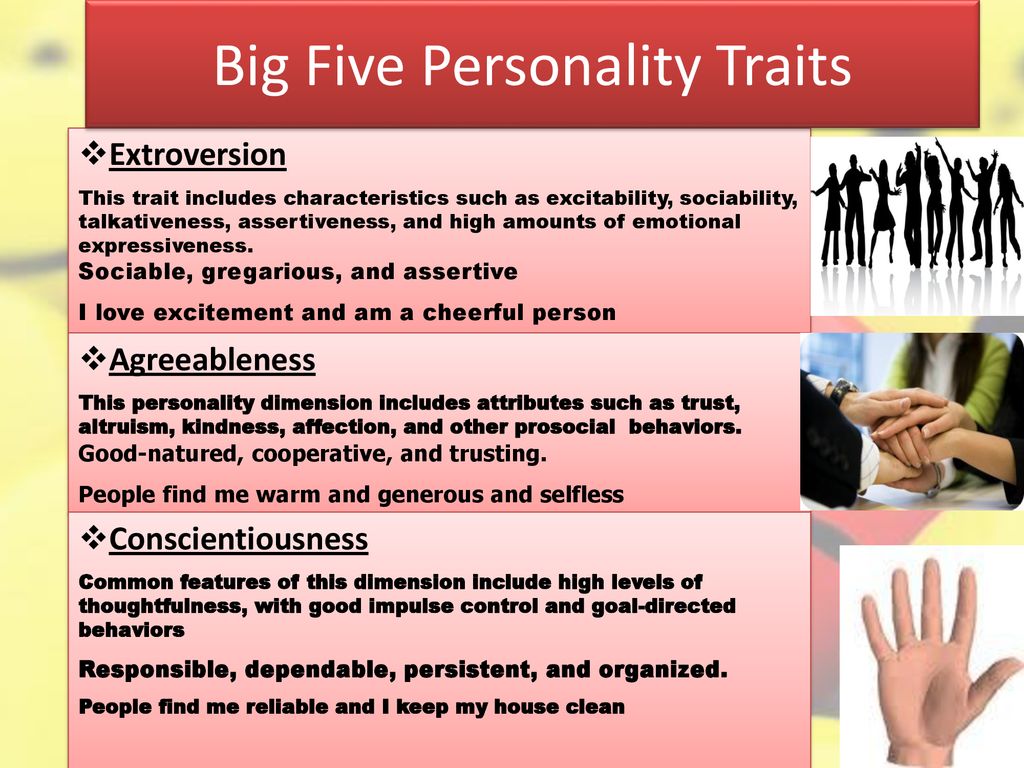 Because of their attention to detail, highly sensitive people are the first to notice changes in a friend's or partner's behavior, work environment, and market situation.
Because of their attention to detail, highly sensitive people are the first to notice changes in a friend's or partner's behavior, work environment, and market situation.
© Guilherme Stecanella/Unsplash
From fragility to empathy
Among highly sensitive people there are many introverts who prefer cozy loneliness or a chamber society of two or three close people to group activities and noisy parties. They often choose solo sports, try to protect themselves from the informational noise (especially from the negative). Many of them dislike horror and psychological thrillers, have a hard time dealing with stories of violence, and try to avoid toxic people in real life. This is because highly sensitive people are, for the most part, amazing empaths. Usually they have high emotional intelligence, they are able to empathize, understand and feel the emotions of another person with amazing accuracy. nine0003
They are the same friends and partners who understand perfectly, find the best words of support, share grief and sincerely rejoice in the success of loved ones. If only for this reason, high sensitivity should not be considered a weakness - after all, it helps to build close and trusting relationships. And this, as numerous studies prove, is one of the main components of a healthy and happy life.
If only for this reason, high sensitivity should not be considered a weakness - after all, it helps to build close and trusting relationships. And this, as numerous studies prove, is one of the main components of a healthy and happy life.
Things to take care of highly sensitive people (and everyone else)
In order to live in harmony with sensitivity and feel only its positive aspects, it makes sense to adjust the lifestyle in accordance with the needs of the body. nine0003
First, get enough sleep. In order not to loosen the already fragile nervous system, sensitive people should follow the routine and sleep hygiene. It is known that poor-quality sleep can lead to irritability, depression and melancholy - you should not provoke a fragile body.
Secondly, fast carbohydrates and caffeine should be limited. Sweets cause spikes in blood sugar and with them bursts of energy with sharp drops. Such an energetic rollercoaster can lead to severe mood swings. And caffeine and other stimulants can provoke hyper-emotionality and agitation.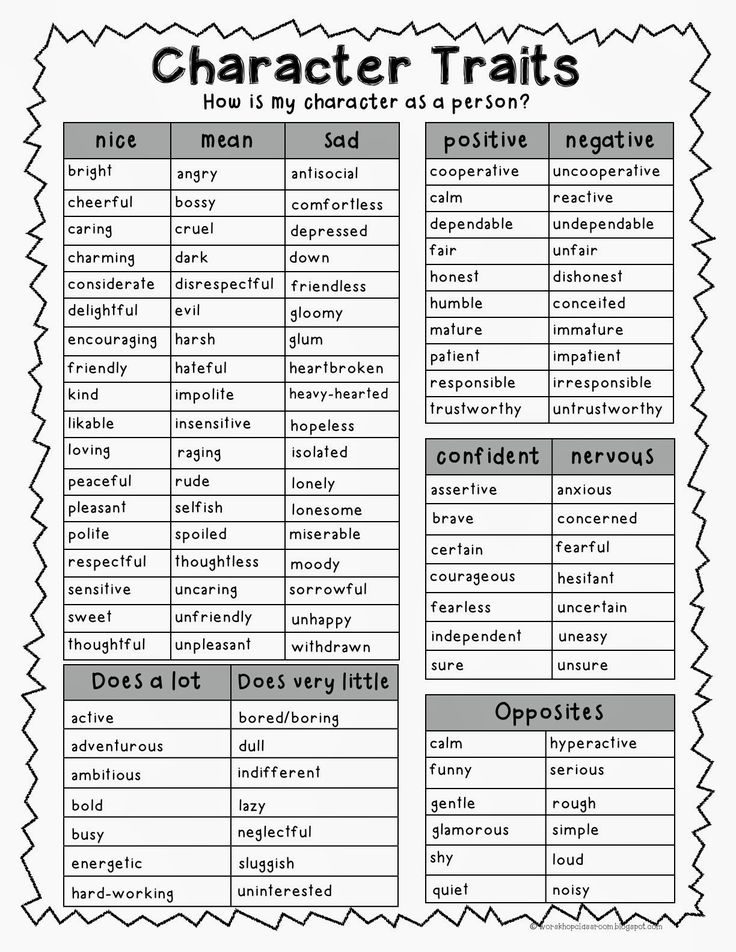 nine0003
nine0003
Thirdly, you need to learn how to find time for yourself. People with hypersensitivity should plan in advance for "relaxing activities" - the time during which they can restore emotional strength and reboot. It can be a weekly hot bath, quiet evening walks, morning yoga, or seasonal trips to country hotels. Separately, it is worth taking care of rest after noisy holidays - birthdays, corporate parties, New Year's and so on.
Fourthly, it is better to surround yourself with comfort. Highly sensitive people acutely experience not only mental, but also physical sensations - tactile, olfactory and visual. Fluffy throws and other soft-touch fabrics, soft subdued lights, scented candles, neutral colors in the interior, beautiful decor, delicious food and drinks - all this can have a therapeutic effect and help to cope with negative emotions. nine0003
What to do if you are too sensitive. And this is noticeable
Increased emotionality is no longer a sign of weakness - it is a feature of the psyche.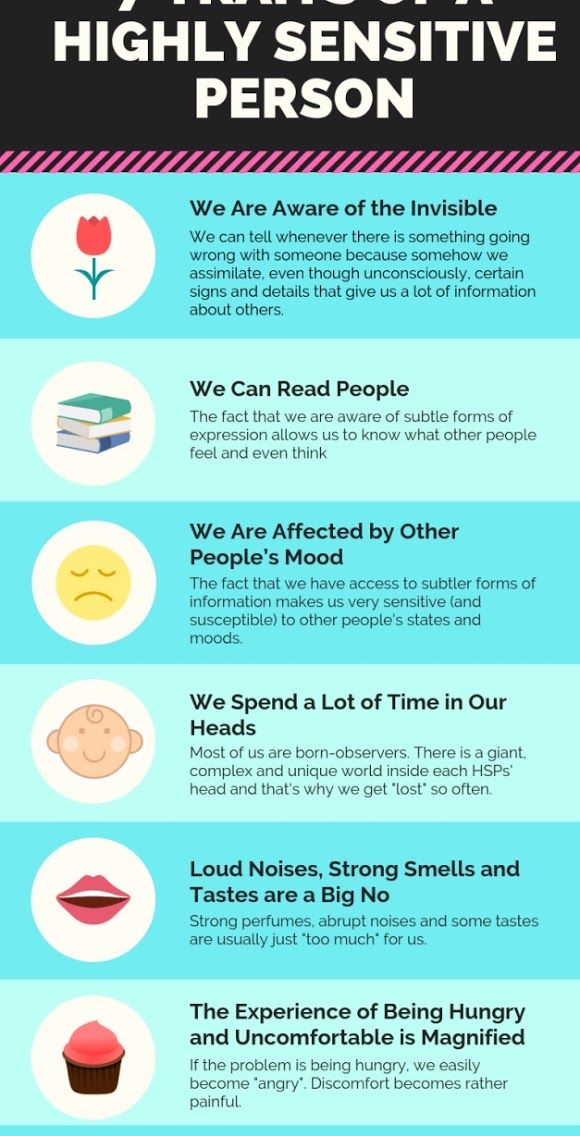 The existence of highly sensitive people has been scientifically proven. In a world where more and more people cannot cope with stress, American psychologists are closely studying those who are especially prone to worry about any reason. "Lifestyle" offers to join them.
The existence of highly sensitive people has been scientifically proven. In a world where more and more people cannot cope with stress, American psychologists are closely studying those who are especially prone to worry about any reason. "Lifestyle" offers to join them.
If you can't stand the bright light and turmoil around you, you can't watch horror movies, and after watching the news about an earthquake or a military conflict, you start to cry out of pity for the victims, you are a highly sensitive person. According to the author of the term Elaine N. Aron, there are about 20% of people like you in the world. This means that it's time to stop hiding your feelings and no longer be ashamed of crying in the movies. nine0003
In today's Western world, it's a shame to be a weakling — and that's why we have to hide our feelings, constantly keep in good shape, pretend that we can live without lunch and sleep and work 12 hours a day, otherwise our colleagues will look askance at us , and the authorities - to make jokes about us.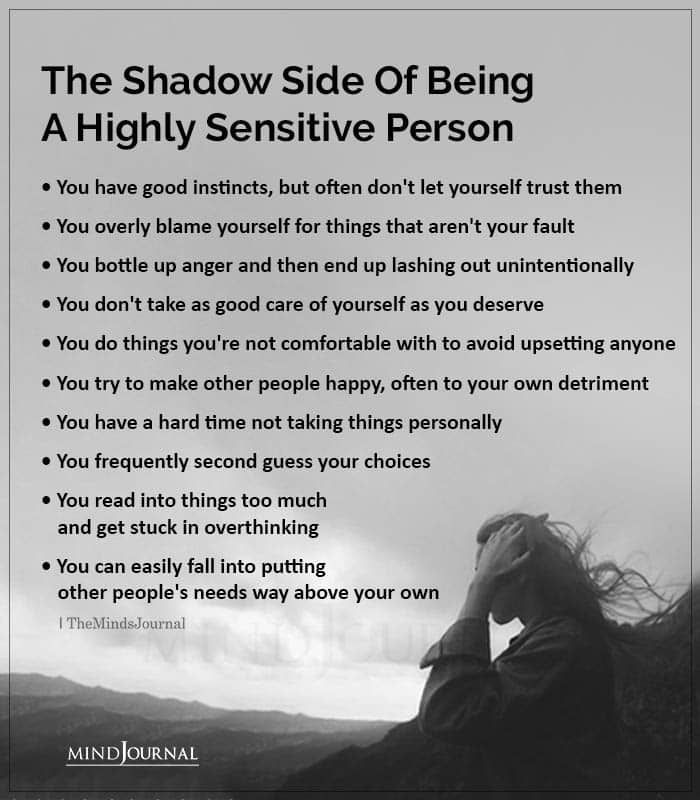
In our country, it is not customary to be capricious, and that is why we are forced to agree to the conditions that we have, to work in a basement or open space, under the wind of an air conditioner, under the harsh light of fluorescent lamps and under the cries of colleagues from neighboring departments. nine0003
close
100%
Are we suffering from all this? Yes, we suffer. In general, we suffer from a lot of things: we can’t stand the feeling of hunger, we can’t watch films about the war, we don’t wear woolen clothes because they prick, we tear off the tags from T-shirts because they get in the way. We cannot work when it is cold, hungry or noisy, we react sharply to criticism and take any comments personally, we catch changes in the mood of others. It remains to say who we are. nine0003
We are highly sensitive people. Do not rush to laugh and call us sissies - and not only because it is very offensive to us.
You may also be one fifth of the world's population, which is characterized by a particularly sensitive processing of sensory information.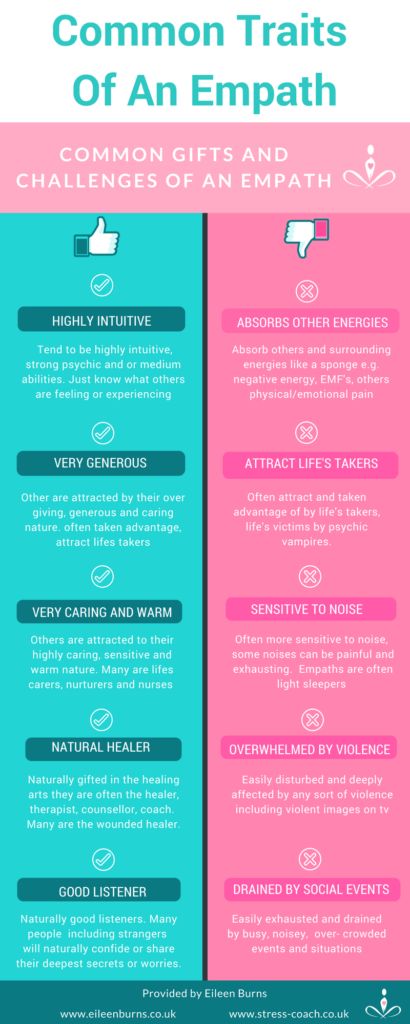 Then you are one of us.
Then you are one of us.
Perhaps you, too, were forbidden to watch the news program as a child, because they show war and starving children in Africa? Maybe you were dying of shame when a geographer slapped you a deuce once in your life? Maybe they hated running and, in general, any form of competition, when everyone is looking at you, and you run no more than a three? Maybe at school it was a real torment for you to raise your hand in class, even if you knew exactly the right answer? Maybe. Or maybe you have other examples from your childhood that will help you to say that you were a highly sensitive child and probably grew up to be a highly sensitive adult as well. nine0003
The term "highly sensitive person" was first used in its current sense by Dr. Elaine Aron, a scientist and author of The Highly Sensitive Person, published in the United States in 1997. The hypothesis that high sensitivity to external stimuli is a feature inherent in about 20% of the inhabitants of the Earth was put forward by a psychologist twenty years ago.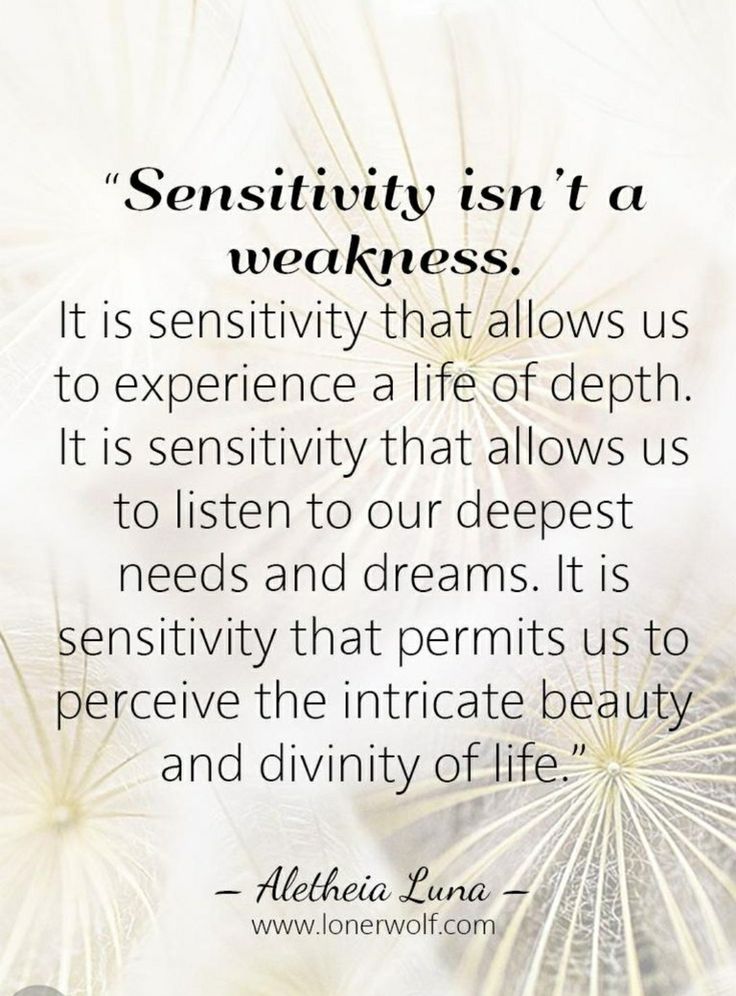
However, the real interest in this idea has awakened among the public only now, when it became clear that more and more people can not cope with stress. nine0003
And I woke up just in time: for twenty years, Dr. Aron and her colleagues have done a lot of research that helped to understand what processes occur in the brain of a highly sensitive person, and to conclude that this feature is innate: certain parts of the brain of such a person react to external stimuli sharper than other, less sensitive people.
And not only negative ones, but also positive ones too. Yes, highly sensitive people feel acute discomfort in awkward situations. But brighter experience the pleasure of contemplating objects of art and views of nature, listening to music, communicating with pleasant people. nine0003
How to know that you are a highly sensitive person
close
100%
1. You have deep feelings
One of the main characteristics of highly sensitive people is the ability to deeply feel what is happening around.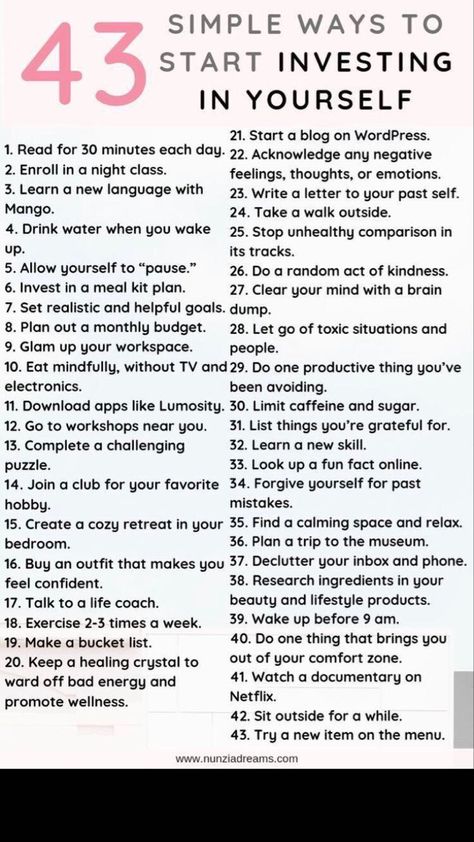 They have developed intuition, which allows them to be more perceptive than their less sensitive comrades.
They have developed intuition, which allows them to be more perceptive than their less sensitive comrades.
2. You react more emotionally than others
Highly sensitive people experience more intense emotions and are often infected by the emotions of others. These are not necessarily close people, they can easily pick up a bad mood from a friend or take care of a colleague's problems. This makes them hate delivering bad news or making unpopular decisions – they worry about how others will react to it. nine0003
3. You are often told: “Don't take it personally.”
Sensitive people are treated differently in different cultures: if in the West emotionality is a manifestation of weakness, then in the East everything is not so simple.
Dr. Ted Zeff, author of The Highly Sensitive Person's Survival Guide, states from his research that in India and Thailand sensitive men are very rarely teased, while in North In America, men with a fine mental organization are often the objects of ridicule. nine0003
nine0003
4. You prefer to exercise alone
Highly sensitive people hate team sports, according to Dr. Zeff. And our experience confirms this: such people like cycling, swimming or walking, but playing football or basketball causes them to panic.
However, there are exceptions: if such a person is lucky with smart and understanding parents, he may not be afraid to show himself in a team.
5. You find it difficult to make elementary decisions
Highly sensitive people are attentive to the details of the situation and the subtleties of circumstances. From this, they try to take everything into account and fall into a stupor, because there is too much of this.
Even the task of choosing an ice cream can confuse them. However, there is good news: having once understood how to behave in a certain situation, in similar conditions in the future, such a person, without getting lost, will immediately do the right thing. nine0003
6.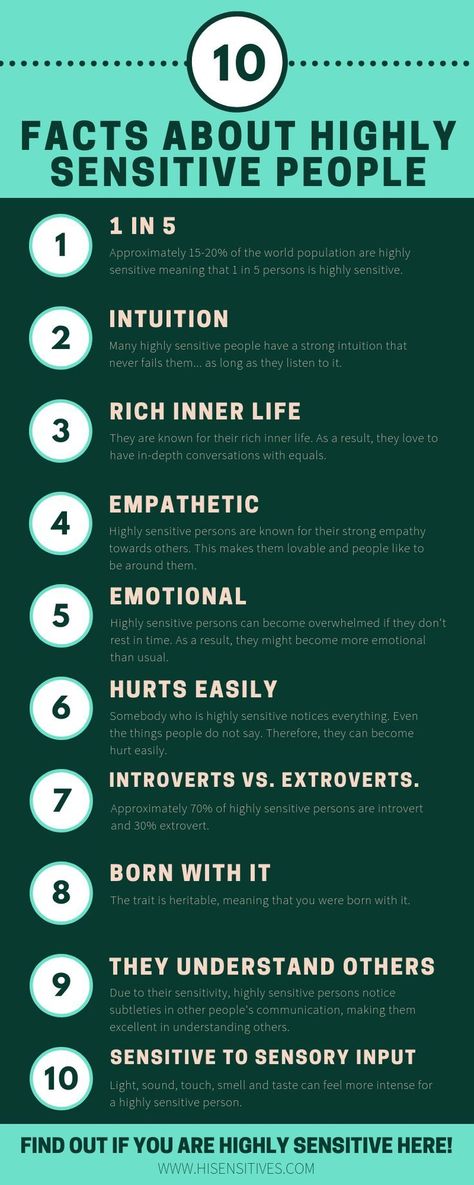 You get upset when you make a mistake
You get upset when you make a mistake
Mistakes upset everyone, but highly sensitive people - especially: because of annoying little things and oversights that others have forgotten to even think about, they can suffer for weeks, imagining that they still remember the mistake.
7. You are an introvert
But there are exceptions: according to Dr. Aron, 30% of highly sensitive individuals are extroverts. This happens when a person grows up in a closed environment where everything is in plain sight, in a village, a small town, a religious community or a family of a public person. nine0003
8. You know how to work in a team
Paradoxically, but true: the depth of experience makes highly sensitive people excellent employees. Only they should not take positions in which they must make final decisions: for example, if it is a doctor, he should have the opportunity to consult with colleagues before prescribing treatment.
9. You are prone to anxiety and depression
This only happens if you have experienced a lot of adversity in the past - but who among us is lucky to do without them at all? Shy people are often teased in childhood: if a highly sensitive person was not given proper support in childhood, he grows up with the feeling that the world is hostile, and only doctors and antidepressants can help here.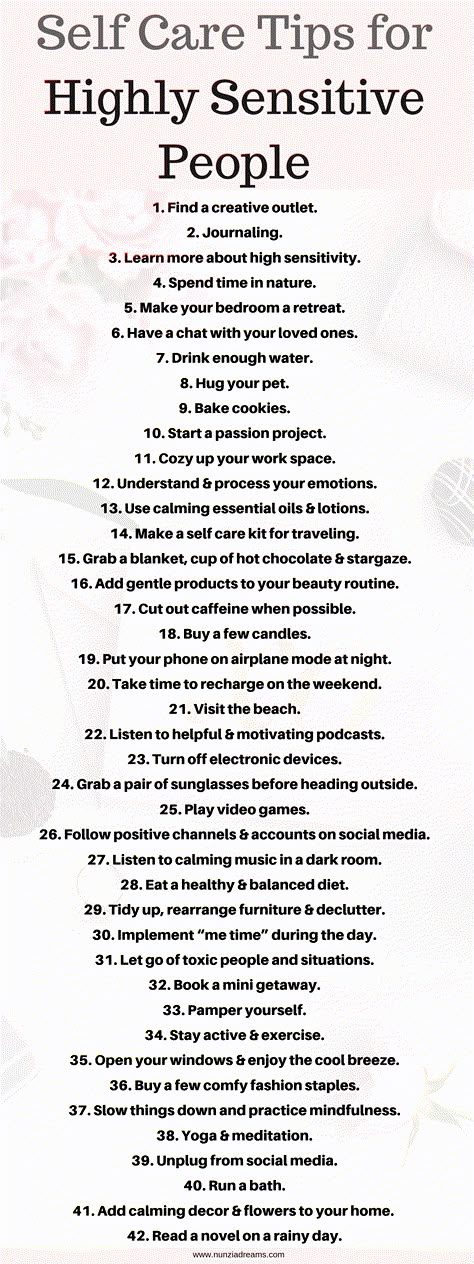 nine0003
nine0003
It is worth taking a closer look at your child: high sensitivity is often inherited.
10. You can't stand sharp sounds
Someone can't stand it when Styrofoam squeaks on glass. Someone - the sound of a perforator or drill. It annoys someone when others eat loudly: champing and smacking is really impossible to endure, why do people even allow themselves to eat with their mouths open ?!
11. You can't see the violence on the screen
A highly sensitive person cannot watch horror films about dismemberment, disaster films about drowning dogs, and arthouse about rape. Lars von Trier, Gaspar Noe and Michael Haneke are cinematic enemies.
Salo by Pier Paolo Pasolini? Look in your VGIK, and it’s enough for us to read the plot.
But you can watch Game of Thrones by closing your eyes in certain places, because the costumes are beautiful.
12. You can cry from scratch
When such a person is offended to tears for some reason, he is really capable of bursting into tears.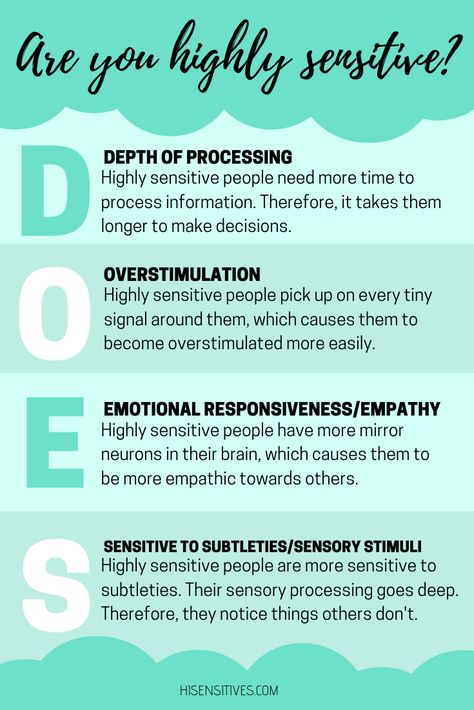 And, by the way, it costs him a lot of effort not to do this. A sad film (without violence), a touching commercial for a charity campaign, a story about a penguin who annually comes to the Brazilian (or Chilean?) who saved him - in general, anything can cause a surge of feelings.
And, by the way, it costs him a lot of effort not to do this. A sad film (without violence), a touching commercial for a charity campaign, a story about a penguin who annually comes to the Brazilian (or Chilean?) who saved him - in general, anything can cause a surge of feelings.
13. You are very polite
Good manners are a hallmark of highly sensitive people: it is important for them not to hurt the feelings of others. They try not to inconvenience others: they regularly give up their seats on public transport, carefully place their carts in the supermarket, let people go ahead, and endlessly apologize and thank you. So sometimes it's even annoying. nine0003
14. You are sensitive to criticism
Highly sensitive people literally cannot stand criticism, taking it to heart. When their team is criticized, they take everything personally.
Because of this, they often use ridiculous defense mechanisms: they try to please everyone in advance, they criticize themselves, they avoid everything that can be a source of criticism.
Dr. Aron claims that self-defense such people use the following methods, which may seem strange to most: minimizing contact, blaming, trying to achieve too high a result, resentment, projecting, refusal to compete. nine0003
15. You can’t work in an open office
Open space is a nightmare for any office employee: noise, bright light that not everyone can bear, constant flickering, talking on the phone, arguments and extraneous smells - all this makes a highly sensitive person's head is spinning, but it does not work out in any way. He is generally incapable of working under pressure: maybe someone needs a good kick to start working, but not for him.
close
100%
10 Rules for a Highly Sensitive Person
1. Remember that you are not alone and that what happens to you is normal.
2. Avoid people you don't like.
3. Avoid situations that tire you.
4. Don't overload your schedule or you may fall off at the most inopportune moment.
